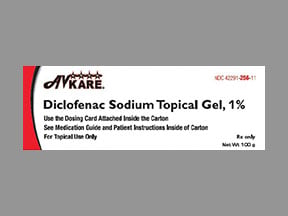
Cvs Diclofenac Sodium Coupons & Savings Card – Discount Prices from $9.65
Brand for: Diclofenac sodium
This medication is used to relieve joint pain from arthritis. Diclofenac belongs to a class of drugs known as nonsteroidal anti-inflammatory drugs (NSAIDs). If you are treating a chronic condition such as arthritis, ask your doctor about non-drug treatments and/or using other medications to treat your pain.
Our Cvs Diclofenac Sodium coupons are free to use. You can print the coupon, email it to yourself, or receive the Cvs Diclofenac Sodium coupon via text message. To get your free discount, show the pharmacist your Cvs Diclofenac Sodium savings card which has the discounted coupon price. Use our filters below to edit the prescription box to match your needs. The Cvs Diclofenac Sodium prices will update based on your prescription needs. Above our Cvs Diclofenac Sodium coupons, you can change the location to see pharmacy prices in other areas. Our prescription discount card will update online with the specific pharmacy costs associated with your edits. Be sure to text, email, or print the Cvs Diclofenac Sodium savings card code that you need after editing the prescription box and location field. Show the discount card to your pharmacist before paying.
My prescription
Edit
100GM of 1%, Diclofenac Sodium (1 Tube)
Select pharmacy

Albertsons
$9.65
COUPON PRICE
Walgreens
$10.99
COUPON PRICE
Walmart
$19.56
COUPON PRICECvs Diclofenac Sodium savings card
Show this card to your pharmacist
Albertsons
$9.65
BIN
ID
PCN
GRP
019876
LHB4E27623
CHIPPO
LHX
Powered by
This medication is used to relieve joint pain from arthritis. Diclofenac belongs to a class of drugs known as nonsteroidal anti-inflammatory drugs (NSAIDs). If you are treating a chronic condition such as arthritis, ask your doctor about non-drug treatments and/or using other medications to treat your pain.
Our Cvs Diclofenac Sodium coupons are free to use. You can print the coupon, email it to yourself, or receive the Cvs Diclofenac Sodium coupon via text message. To get your free discount, show the pharmacist your Cvs Diclofenac Sodium savings card which has the discounted coupon price. Use our filters below to edit the prescription box to match your needs. The Cvs Diclofenac Sodium prices will update based on your prescription needs. Above our Cvs Diclofenac Sodium coupons, you can change the location to see pharmacy prices in other areas. Our prescription discount card will update online with the specific pharmacy costs associated with your edits. Be sure to text, email, or print the Cvs Diclofenac Sodium savings card code that you need after editing the prescription box and location field. Show the discount card to your pharmacist before paying.
Our Cvs Diclofenac Sodium coupons are free to use. You can print the coupon, email it to yourself, or receive the Cvs Diclofenac Sodium coupon via text message. To get your free discount, show the pharmacist your Cvs Diclofenac Sodium savings card which has the discounted coupon price. Use our filters below to edit the prescription box to match your needs. The Cvs Diclofenac Sodium prices will update based on your prescription needs. Above our Cvs Diclofenac Sodium coupons, you can change the location to see pharmacy prices in other areas. Our prescription discount card will update online with the specific pharmacy costs associated with your edits. Be sure to text, email, or print the Cvs Diclofenac Sodium savings card code that you need after editing the prescription box and location field. Show the discount card to your pharmacist before paying.
Cvs Diclofenac Sodium FAQs
Using the SaveHealth discount card, what is the price of Cvs Diclofenac Sodium without insurance?
Using the SaveHealth discount card, the price of Cvs Diclofenac Sodium without insurance is $9.65.
What is the price of Cvs Diclofenac Sodium at Walgreens?
The price of Cvs Diclofenac Sodium at Walgreens is $10.99.
What is the price of Cvs Diclofenac Sodium at Walmart?
The price of Cvs Diclofenac Sodium at Walmart is $19.56.
